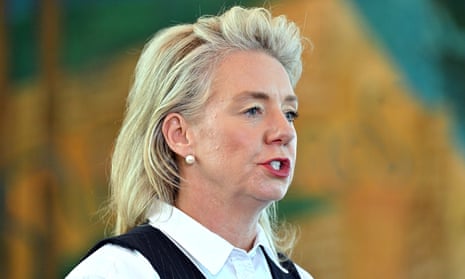Coalition senator calls for power to force Qantas to sell Jetstar
Nationals senator Bridget McKenzie has written for the AFR calling for divesture powers for airlines.
Specifically, threatening Qantas with the forced sale of its low-cost brand, Jetstar.
“[The government’s] competition review will be a failure if it does not address the role of divestiture in the Australian aviation sector,” McKenzie writes.
McKenzie, expanding a Nationals call for more divesture powers, which includes the major supermarkets, says that the threat may be one of the only ways to ensure competition in the Australian aviation market.
Peter Dutton endorsed the Nationals’ call when it came to supermarkets, despite discomfort from some Liberals. The Coalition did not move on divesture powers while in government for almost a decade, despite the original threat against energy companies.

Key events
The government’s response to online privacy reforms will be a little clearer this week – Paul Karp has taken a look at what that will mean (and more importantly, what it won’t)
More than 70% of Centrelink recipients cutting back on meals, medications and seeing friends due to cost, Acoss says
The Australian Council of Social Service (Acoss) has a new report showing that almost three-quarters of people on jobseeker, youth allowance and the parenting payment are cutting back on meat, fruit and vegetables, because they can not afford it. Three in four are also struggling to afford their medications.
The research found:
-
71% are cutting back on meat, fresh fruit and vegetables. 51% are skipping meals altogether.
-
74% are having difficulty affording the medicine or medical care they need. 92% said that the low rate of income support harmed their mental health and 84% said it harmed their physical health.
-
68% are cutting back on heating or cooling their homes, 54% are cutting back on using lights, and 42% go to bed early to save money.
-
81% said they use their car less than they would otherwise and 87% see friends and family less often.
-
94% of people renting privately are in rental stress, paying more than 30% of their income on rent.
Acoss is calling on the government to:
-
Lift income support payments to at least the pension rate, currently $80 a day, and index to wages as well as price movements.
-
Establish a disability and illness supplement to recognise the additional costs that people with disability and chronic illness face.
-
Establish a single parent supplement.
Coalition senator calls for power to force Qantas to sell Jetstar
Nationals senator Bridget McKenzie has written for the AFR calling for divesture powers for airlines.
Specifically, threatening Qantas with the forced sale of its low-cost brand, Jetstar.
“[The government’s] competition review will be a failure if it does not address the role of divestiture in the Australian aviation sector,” McKenzie writes.
McKenzie, expanding a Nationals call for more divesture powers, which includes the major supermarkets, says that the threat may be one of the only ways to ensure competition in the Australian aviation market.
Peter Dutton endorsed the Nationals’ call when it came to supermarkets, despite discomfort from some Liberals. The Coalition did not move on divesture powers while in government for almost a decade, despite the original threat against energy companies.
Union call for 12-day nationwide standard for reproductive leave
The Health Services Union is pushing for 12 days of reproductive leave to be made standard nationwide.
Disability service provider Scope has agreed to the leave, which will cover “IVF, severe menstrual pain, endometriosis, vasectomies, menopause, gender transitioning therapies and other health issues”.
The HSU now wants the 12-day entitlement to be part of minimum standards and union officials will be in Canberra this week to lobby for the changes.
The HSU’s national senior assistant secretary, Kate Marshall, said people, mainly women, were using up all their leave to look after reproductive health.
Making 12 days’ reproductive leave part of the minimum entitlements for all workers will have incredible benefits across the entire economy.
Women will be able to stay in the workforce longer, build more superannuation and help us close the gender pay gap.
Westpac announces new CEO
Westpac has announced a new CEO: Anthony Miller will be stepping into the role following Peter King’s retirement.
Miller is currently the bank’s chief executive for its business and wealth division, but before joining Westpac, he was head of the Australia/New Zealand division for Deutsche Bank. He was also a partner at Goldman Sachs.
He’ll take over the role on 16 December.
The governor-general, Sam Mostyn, will receive the royal commission into defence and veterans’ suicide final report at 11am.
It will then be up to the government to decide when it is tabled and made public.
Penalties for social media companies under proposed ban should be ‘in seven figures’: Malinauskas
Peter Malinauskas said in order for the government ban to work, the penalties have to be serious:
Well, it has to be seven figures for those companies that knowingly, willingly, break the law with impunity. That comes out of the [Robert] French report. This is about creating an economic deterrence for those companies who really go about their business breaking the law. Infringements will happen, and there are lower levels of infringement notices that can be issued by a regulator under the proposition by Robert French.
But where we see the most egregious breaches of the law, where it is done willingly, and then civil penalties can apply, and that would have to be of a seven-figure magnitude and talking about millions of dollars, given the nature of it.
Social media companies ‘industrialising addiction’ in children, SA premier says
The SA premier said the ban was about doing what is right:
I mean, I don’t think that we can overstate this. Parents around the country are tearing their hair out with children who are suffering these addictions and knowing that they’re doing them harm. And even for kids themselves.
I mean, you ask children, “do you want to give up social media?”, and they’ll say no.
But if you ask them whether or not if they would give up social media if all of their friends would do it as well, they all would gladly give it up. We know that something is up here.
We know that the companies industrialise the addiction for their own purpose, which is actually what invites governments to respond, and that’s what we’re going to do in South Australia, and I hope that the rest of the country is able to get on board.
Peter Malinauskas says that the SA government is confident it can work out the legal issues with its proposal to ban under 14s, and the tech is there to ensure age verification can work:
There are substantial advances made to age verification globally. And they’re already in place in some areas. The commonwealth is now trialling that as a federal level, which we think is a good thing.
But it is about putting the obligation upon the companies themselves. This shouldn’t be up to parents or children, or even governments.
The governments should be able to impose the obligations upon the services that are, quite frankly, profiteering out of addiction.
South Australia proposes social media ban for under-14s
South Australia’s Labor government wants to ban children who are under 14 from social media.
The premier, Peter Malinauskas, told the ABC it was about protecting children:
There is now a substantial and growing volume of international peer-reviewed research that makes it clear that social media addiction is actually doing children great harm that can be long lasting, particularly when it comes to their mental health. So what we are seeking to do is replicate what other parts of the world are now doing, and that is putting an obligation upon social media services and platforms from allowing children under the age of 14 getting access to accounts and allowing their addiction to take hold. So, we think that we can go a long way to making a difference. It is not a silver bullet but about making a difference where we can.

Karen Middleton
Government to begin testing age-verification technology for social media platforms
The federal government is set to begin testing technologies aimed at verifying the age of social media users and stopping children from accessing adult material, with phase three of the $6.5m age assurance trial starting on Tuesday.
The first two phases involved assessing the community’s willingness to use age-verification technologies if they were available, and consulting with industry and key affected and interested sections of the community.
The third phase will test the effectiveness of technologies that are activated when a phone, computer or tablet is set up, and those that are activated via an operating system, app store or through individual apps and platforms.
The communications minister, Michelle Rowland, said parents were rightly concerned for their children’s safety.
But parents and young people themselves have told me they also expect government to consider privacy, the ethics of different technologies and not isolating young people from their digital native world in our policy response.
Rowland said big tech and social media platforms share a responsibility for users’ safety.
Any parent hearing the message from social media companies that protecting children from harmful online content is the parent’s sole responsibility would be rightly dismayed.”
The three-phase trial is part of a suite of existing government measures to address issues relating to social media access and influence, including funding free school digital literacy programs and providing free information guides on using parental controls and on talking to kids about online safety. The government is also reviewing the Online Safety Act, introducing codes of practice for platforms in relation to pornography regulation and online dating, and updating its “stop it at the start” anti-misogyny advertising campaign.
The age-verification trial is expected to provide guidance on how ready the sector is to provide effective age assurances and provide advice to both government and the eSafety commissioner on the future enforcement of policies and codes of practice.

Lisa Cox
Invasive species could cost NSW nearly $30bn a year by 2030, new report says
Failure to properly manage invasive species in New South Wales, including the speed at which some pests spread, could cost the state $29.7bn a year by 2030, according to a new report released by the Minns government.
The “worst case scenario” figure is in a Natural Resources Commission review of the management of invasive species in the state, which include feral cats, foxes and weeds.
The report finds there has been a lack of strategic planning and resourcing of programs to control or eradicate pests. Among a raft of recommendations, it calls for development of a framework to prioritise and resource programs that reduce current and future risks posed by invasive species. It recommends five yearly funding commitments from Treasury.
The report notes that impacts caused by pest animals such as feral cats and foxes are more prominent and well understood and, when each invasive species is considered individually, widespread feral animals have a greater impact than any single weed species.
But it adds:
However, the overall number of weed species is larger than pest animal species and their combined impacts and associated costs are also much greater.
The NSW agriculture minister, Tara Moriarty, said the government had already taken some steps towards addressing the recommendations by creating an independent biosecurity commissioner role and committing “record” funding to biosecurity and the NSW Local Land Services. She said the government commissioned the review so it could “understand the problems we inherited from the former Nationals/Liberal government’s management of this critically important area”:
We are committed to responding to the NRC report comprehensively and we are already reviewing the current compliance settings to make sure they are fit for purpose.
In addition, we will be making sure that public land managers are not only compliant but are leading the way in how they manage the public estate for future generations.
Good morning
Hello and welcome back to parliament, where we pick up where we left off – with the government trying to define itself as handling the cost-of-living crisis and the opposition doing all it can to derail the government’s narrative.
In the parliament, the super on paid parental leave legislation will be up for debate, and the legislation to put in place the phased-in 15% pay rise for early childhood educators will be introduced.
The Hecs legislation will also be debated (that is the one changing how interest is indexed), but all eyes will be on the future made in Australia legislation debate, given its importance to the Albanese government.
You’ll also see the independent parliamentary standards commission legislation, logging laws and multinational tax pop up in the legislative mix.
After two weeks in a mess of its own making over scrapping gender and sexuality questions from the census, the government has reverse-ferreted and announced the 2026 census will have a gender and sex section after all. It still won’t ask questions on variations of innate sex characteristics, but it is hoping that reinstating the other questions will cut down on criticisms.
But so far this year, the parliamentary weeks have been dominated by what Peter Dutton and the opposition are doing, as the legislative agenda gets pushed to the side. With the ongoing argument over the government’s response to the reserve bank, inflation and cost of living in general, don’t expect that to change.
Meanwhile, the royal commission into defence and veteran suicide will be handed down, with the government to decide when it is tabled.
The number one recommendation in the interim report, reinforced by the commission in its closing ceremony, is for an oversight body – with teeth – to be established, to ensure that all agencies and departments follow through with what needs to happen in addressing the issue.
We’ll follow all the day’s news and more as the first sitting day unfolds. You have Karen Middleton, Paul Karp, Sarah Basford Canales and Daniel Hurst with you in Canberra and Mike Bowers behind the camera. You’ll also have me, Amy Remeikis, with you on the blog.
Ready? Let’s get into it.







